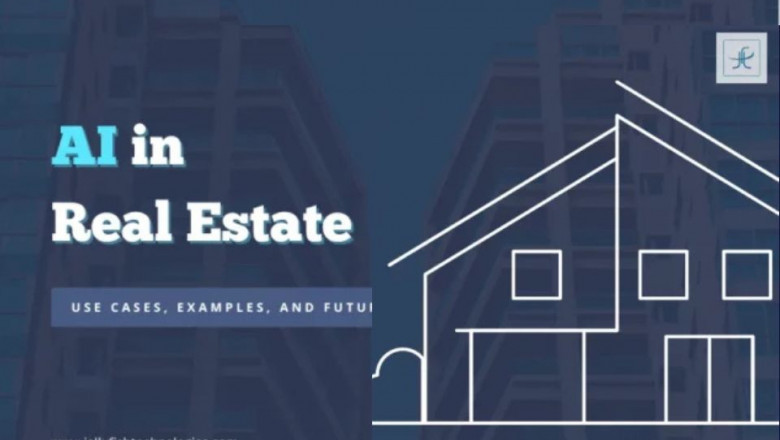views
Four technological pillars are at the heart of this change:
-
AI-driven property search
-
Virtual site visits
-
Smart contracts
-
Digital land records
Together, these innovations are improving user experience, building trust, and unlocking new efficiencies for buyers, sellers, developers, and regulators alike.
1. AI-Driven Property Search
In the past, finding a property involved newspaper ads, broker networks, and endless site visits. Today, thanks to artificial intelligence, property discovery is far more intelligent, personalized, and data-driven.
How AI is Improving Property Search:
-
Personalization: AI learns user preferences (budget, location, amenities) and suggests relevant listings.
-
Predictive Insights: Platforms analyze user behavior to show properties likely to sell faster or appreciate in value.
-
Natural Language Search: Users can search using conversational queries like “2 BHK near metro station under ₹60 lakhs” and get accurate results.
-
Image Recognition: AI can analyze property images to detect key features (like modular kitchens or swimming pools) and tag them automatically.
Companies like Magicbricks, 99acres, and NoBroker are already using AI-powered recommendation engines. The future lies in integrating these platforms with hyperlocal data—traffic, pollution levels, water supply, crime rates—to further refine recommendations.
AI isn’t just making it easier to find homes—it’s reshaping how people evaluate properties before they even step out the door.
2. Virtual Site Visits: Real Estate Goes Immersive
One of the biggest shifts during the COVID-19 pandemic was the adoption of virtual site visits. Today, this trend continues to grow, especially among NRI buyers and tech-savvy millennials.
Key Benefits of Virtual Tours:
-
Convenience: Buyers can explore multiple properties from their homes, saving time and travel costs.
-
360-Degree Views: Immersive experiences allow users to walk through living rooms, bedrooms, balconies, and more.
-
AR/VR Integration: Augmented and virtual reality let users visualize interiors with customized furnishings, colors, and layouts.
-
Real-Time Video Walkthroughs: Sales agents can offer live guided tours via video calls, answering queries on the spot.
Virtual tours are particularly beneficial in Tier 2 and Tier 3 cities, where many buyers are working professionals or NRIs purchasing homes for their families. Developers using these tools are seeing higher engagement and faster conversion rates.
As bandwidth improves and AR/VR hardware becomes more affordable, virtual site visits will become a standard offering across India’s real estate platforms.
3. Smart Contracts: Trustless, Tamper-Proof Transactions
One of the biggest pain points in Indian real estate has always been the paperwork—lengthy agreements, missing clauses, forgery, and fraud. That’s where blockchain-based smart contracts come in.
What Are Smart Contracts?
Smart contracts are self-executing digital contracts where terms are written in code and stored on a blockchain. They automatically trigger actions (like transferring ownership or funds) once conditions are met.
Advantages in Real Estate:
-
Tamper-Proof: Once created, smart contracts can’t be modified without consensus.
-
Instant Execution: No more delays due to manual paperwork or dependency on intermediaries.
-
Cost-Effective: Reduces the need for middlemen like legal consultants, notaries, and brokers.
-
Transparent: All parties have access to the same version of the contract, increasing trust.
Smart contracts can simplify processes like:
-
Sale and purchase agreements
-
Lease agreements
-
Security deposits
-
Commission payments
Although blockchain adoption in India is still in its infancy, regulatory clarity is improving, and pilots are already underway in Maharashtra and Telangana for real estate transactions using blockchain technology.
4. Digital Land Records: Eliminating Title Disputes and Fraud
One of the biggest sources of litigation in India is land ownership. More than 66% of civil cases in India are related to land and property. This is largely due to outdated, paper-based land records that are often incomplete or disputed.
The Digital Land Records Movement:
The Indian government launched the Digital India Land Records Modernization Programme (DILRMP) to digitize land records across all states. The aim is to:
-
Create Unique Land Parcel Identification Numbers (ULPINs), like an Aadhaar for land.
-
Make mutation and registration processes fully digital and real-time.
-
Enable GIS-based land mapping for better planning and transparency.
States like Karnataka, Maharashtra, and Andhra Pradesh are leading the way in digitizing records and making them accessible through online portals. These efforts drastically reduce fraud, encroachments, and delays in property transfer.
For buyers, having access to verifiable, tamper-proof digital land titles builds confidence and speeds up decision-making.
A Unified Digital Ecosystem
What makes this technological revolution truly impactful is the interconnectedness of these tools.
Imagine a homebuyer:
-
Uses AI tools to discover suitable properties.
-
Takes a virtual tour of shortlisted homes.
-
Downloads digitized land titles and checks RERA compliance instantly.
-
Signs a smart contract and pays digitally—without a single physical visit.
This is no longer fiction. It’s the emerging reality of Indian real estate.
Role of Real Estate-Tech Collaborations
This wave of innovation is powered by collaborations between real estate companies and technology firms. A great example of this is the partnership between HexaHome and Hexadecimal Software.
-
HexaHome, a growing real estate brand in India, is embracing PropTech to enhance customer experience, streamline project management, and improve transparency in sales.
-
Hexadecimal Software, a forward-thinking tech firm, specializes in custom solutions for the real estate industry—offering tools like:
-
AI-powered dashboards
-
Blockchain-enabled contracts
-
Integrated RERA compliance modules
-
Virtual site visit integration
-
Together, HexaHome and Hexadecimal Software are setting new standards in how real estate is marketed, sold, and managed—bringing the future of property tech to the Indian homebuyer today.
Conclusion
The future of Indian real estate lies at the intersection of technology and trust. With AI simplifying discovery, virtual tools enhancing transparency, blockchain ensuring security, and digital land records reducing disputes, the buying and selling of property is becoming smarter and more efficient.
As companies like HexaHome and Hexadecimal Software lead the charge, India is poised to become a global leader in real estate innovation. The journey from paperwork to platform is well underway—and the impact will be felt by every stakeholder in the value chain.














Comments
0 comment